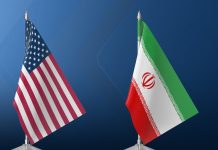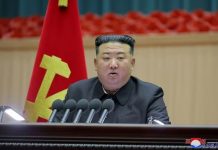DM Monitoring
GAZA: Hezbollah deputy chief Naim Qassem said Tuesday the Lebanese group supported Lebanese efforts for a ceasefire with Israel, after two weeks of heavy Israeli strikes that killed its leader.
“We support the political efforts that (Lebanese Parliament Speaker) Nabih Berri is undertaking to-wards a ceasefire,” Qassem said in a televised speech.
After nearly a year of cross-border clashes, Israel intensified its bombing campaign on September 23, killing more than 1,100 people and displacing over a million people since, according to official figures.
A massive Israeli strike killed the Shia party’s leader Hassan Nasrallah in Beirut’s southern suburbs on September 27.
“Once a ceasefire is achieved, diplomacy can look into all the other details,” Qassem said on Tuesday.
Prime Minister Najib Mikati and Berri, a powerful Shia ally of Hezbollah, have for days been striving for an immediate truce between Israel and Hezbollah, independent of Gaza truce efforts. Iran’s Foreign Minister Abbas Araghchi said on Friday, however, that Tehran backed efforts for a “sim-ultaneous” ceasefire in both Lebanon and the Palestinian territory.
Qassem, who has taken over until a new Hezbollah leader is announced, said the group’s military ca-pacities and leadership were still strong despite the heavy Israeli bombardment.
“The party’s leadership and the resistance (Hezbollah) are meticulously organised… We have over-come painful blows,” he said.
“I would like to reassure you that our capabilities are fine,” he said, speaking of “hundreds of rockets” fired at Israel. Since the Gaza Strip war began a year ago, Israel and Hezbollah have engaged in near-daily cross-border clashes, with Hezbollah saying it is acting in solidarity with its ally Hamas in the Pales-tinian territory.
Prime Minister Benjamin Netanyahu and other Israeli officials have stressed the need to secure the north near the border with Lebanon so uprooted residents can return home. “Netanyahu says he wants to bring back” the displaced to their homes in northern Israel, Qassem said.
But “we say that many more residents will be forced to flee” their homes, he warned.
Qassem added that an election for a new Hezbollah secretary-general would be held “according to the regulations” and the result would then be announced, but he did not give a clear timeline. On the other hand, Prominent US Republican Senator Lindsey Graham urged Saudi Arabia and Israel on Tues-day to establish diplomatic ties by the end of the year, warning that the next US administration is un-likely to be able to secure enough votes to support the deal.
The Biden administration is seeking to broker a normalisation accord between the two countries that would include US security guarantees for Gulf state Saudi Arabia, among other bilateral deals between Washington and Riyadh.
“We can get you a treaty through the Senate between the United States and Saudi Arabia, a defense agreement like you have in Japan and Australia, if you do it on President Biden’s watch,” Graham, who is seen as close to Republican presidential candidate Donald Trump, told reporters in Jerusalem.
“The next president will have a very difficult time getting 67 votes,” he said in reference to the two-thirds majority needed in the US Senate for approving a defense treaty.
Democrat Joe Biden’s term as president will end on Jan. 20. Graham, a longtime senator, is a key Re-publican in Congress with influence on foreign policy and national security matters.
Graham, who met Israeli Prime Minister Benjamin Netanyahu on Monday, said he would travel to Saudi Arabia to meet de facto ruler Crown Prince Mohammed bin Salman and to the United Arab Emir-ates for talks with President Sheikh Mohammed bin Zayed Al Nahyan.
Saudi officials, including Prince Mohammed, have discussed potentially establishing ties with Israel but over the past year insisted that it include at least the pathway to a Palestinian state, a markedly steep-er challenge since the Gaza war erupted.
Israeli-Saudi normalisation could open the door to many other Arab and Muslim-majority nations forg-ing ties with Israel, bolstering regional stability, given Riyadh’ sway in the Muslim world as home to Is-lam’s two holiest sites in Makkah and Media.
But even before the Oct. 7, 2023 attack on Israel by Hamas that triggered the war, Netanyahu’s right-wing government had rejected a “two-state solution” to the conflict with Palestinians.
Graham said the two-state solution – an independent Palestinian state alongside Israel – had been “dead” ever since the cross-border assault by Hamas.
“The Israeli public will not accept a Palestinian state as a result of this barbaric terrorist attack, because it’s rewarding terrorism. I get that,” Graham said, but he added Israel could work with Riyadh, along with the UAE, on the Palestinian file.
Over 41,000 Palestinians in Gaza have been killed in Israel’s devastating retaliatory war against Hamas in the coastal enclave, according to Palestinian health authorities.
Riyadh has repeatedly called for an end to the war and said the two-state solution and regional stabil-ity are interdependent.
Netanyahu has said that establishing diplomatic ties with Saudi Arabia would lead to a “historic recon-ciliation” between Arab states and Israel, and between Islam and Judaism and vowed to pursue an accord.
Israel has diplomatic ties with a few Arab or Muslim-majority states including the UAE, Egypt, Jordan and Morocco.
The two-state solution has also been put further out of reach by the rapid expansion of Jewish settle-ments in the West Bank, which Israel occupied in a 1967 war and which Palestinians want as the core of a future state along with Gaza.





